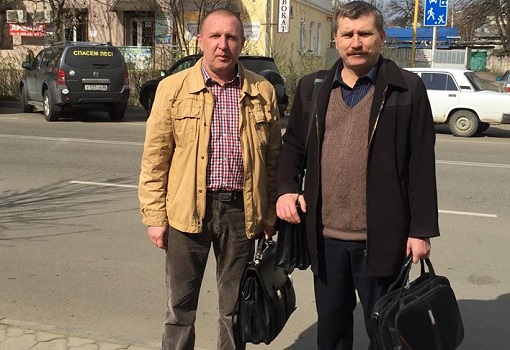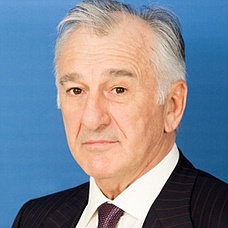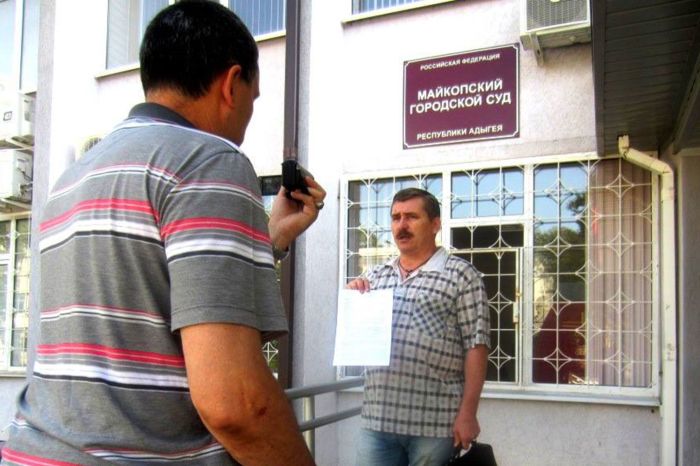
Adygean Court Drops “Extremism” Case against Environmentalist Valery Brinikh
Agora
August 7, 2017
Maykop City Court today dropped the “extremism” criminal case against well-known local environmentalist Valery Brinikh, director of the Institute for Regional Biological Research. Brinikh was on trial for, allegedly, having insulted the dignity of the Adgyean people by writing and publishing an article entitled “The Silence of the Lambs.” The court dropped the case for want of criminal culpability.
He was explained his right to exoneration. This news from courtroom was reported by Alexander Popkov, an attorney with the Agora International Human Rights Group, who represented Brinikh along with attorney Andrei Sabinin.
“Today in court, the state prosecutor filed a motion to drop the charges of incitement of hatred against Brinikkh and drop the criminal case for want of criminal culpability in his actions,” said Popkov. “The judge retired to chambers before he announced the decision to terminate the criminal case. The ultimate argument in favor of this decision was a forensic examination carried out by the FSB Criminalistics Institute, which found no traces of “extremism” in the environmentalist’s article. A total of four expert opinions and three forensic examinations had been ordered in the case, and only one of them supported the charges. The case lasted almost three years.
According to police investigators, in the fall of 2014, Valery Brinikh, director of the Institute for Regional Biological Research, and ex-director of the Caucasus Nature Reserve (1999-2001) и the Daur Nature Reserve (1993-1999), had produced “extremist” matter, an original article entitled “The Silence of the Lambs.” The article dealt with the environmental mental problems caused by one company’s hog-breeding facility in Adygea’s Teuchezhsk District. The company was founded by Vyacheslav Derev, representative of Karachay-Cherkessia in the Federation Council.

The investigators claimed that Brinikh subsequently conveyed this matter to unidentified persons for dissemination on the internet. The environmentalist’s article was published on a local website. The defense did not agree with the prosecution’s argument, saying it was absurd, a violation of freedom of speech and freedom of expression.
On December 14, 2014, Maykop City Court ruled the article “The Silence of the Lambs” “extremist” matter. In March 2015, the Adygea Supreme Court upheld the lower court’s decision.
ADV-TV, published on YouTube on August 7, 2017. On August 7, 2017, Maykop City Court dropped the “extremism” criminal case against well-known local environmentalist Valery Brinikh, director of the Institute for Regional Biological Research. Brinikh was on trial for, allegedly, having insulted the dignity of the Adgyean people by writing and publishing an article entitled “The Silence of the Lambs.“ The court dropped the case for want of criminal culpability. Brinikh was defended in court by attorney Andrei Sabinin and attorney Alexander Popkov, with the Agora International Human Rights Group.
* * * * * *

Court Refuses to Rule Biologist “Extremist”for Criticizing Hog Breeders
Although Article Containing the Criticisms Remains on List of “Extremist” Matter
Anastasia Kornya
Vedomosti
August 8, 2017
On Monday, Maykop City Court terminated the “extremist” criminal case (Russian Criminal Code Article 282) against Valery Brinikh, director of the Institute for Regional Biological Research. He was on trial for the article “The Silence of the Lambs,” about the environmental damaged caused by the Kievo-Zhuraki Agro-Industrial Complex. The news was reported Alexander Popkov, an attorney with the Agora International Human Rights Group, one of Brinikh’s defense attorneys.
The charges had been filed in December 2014. According to police investigators, the article contained a negative assessment of ethnic Adyghes. Ultimately, however, the prosecutor’s officer dropped the charges. The decisive argument was a forensic examination, conducted by the FSB Criminalistics Institute, which found no evidence of “extremism.” The article contains criticism of the republic’s authorities, “but criticism of persons engaged in political activity is the norm in a civic, democratic society,” the report concludes.
Investigators cited the conclusions of Sergei Fedyayev, an analyst at the Interior Ministry’s Criminalistics Center for Krasnodar Territory. Fedyayev argued that the negative connotations of the word “sheep” extended to the word “lamb,” as used in the article. On the basis of the report written by this same analyst and at the request of the republic’s prosecutor’s office, in December 2014, the Maykop City Court ruled that Brinikh’s article was “extremist” matter. Thus, Brinikh has been cleared of “extremist” charges, but his articles is still listed in the database of extremist matter.
Popkov argues that the ruling is a precedent. He cannot remember similar cases. Theoretically, one of the parties could petition the court to exclude the article from the list of extremist matter, but his client has not yet decided whether he will pursue this. The Adygea Prosecutor’s Office did not respond promptly to our request for a reaction to the ruling.
From a legal point of view, the case is not absurd, argues a source in law enforcement. The author of a text considered “extremist” may not be an “extremist” himself. In this case, the decisive role is played by the intent in his actions to incite hatred. It might well transpire that the individual had no sinister intent whatsoever, but after the text he authored has been published, it lives its own life.
Alexander Verkhovsky, director of the SOVA Center, knows of cases when matter has been excluded from the official list of “extremist” matter, but not due to the acquittal of suspected “extremists.” That happens all to rarely. However, the case in Maykop is a good illustration of the poor quality of such judicial rulings, he notes. In approximately half of cases, matter is ruled extremist using a simplified procedure. Authors are usually not involved in the case, and so no dispute as such arises. Recently, the Prosecutor General’s Office tightened the procedure for applying to the courts with such requests. Now they can be made only by regional prosecutors and only after they have vetted the request with the Prosecutor General’s Office. Verkhovsky acknowledges that such measures have indeed worked, but they have not solved the problem of rubber-stamp court decisions on “extremist” matter, he argues.
Translated by the Russian Reader. Thanks to Comrade AK and Comrade Uvarova for the heads-up. See all my previous postings on the Brinikh case.
Discover more from The Russian Reader
Subscribe to get the latest posts to your email.
One thought on ““Extremism” Case against Adygean Environmentalist Valery Brinikh Dropped”